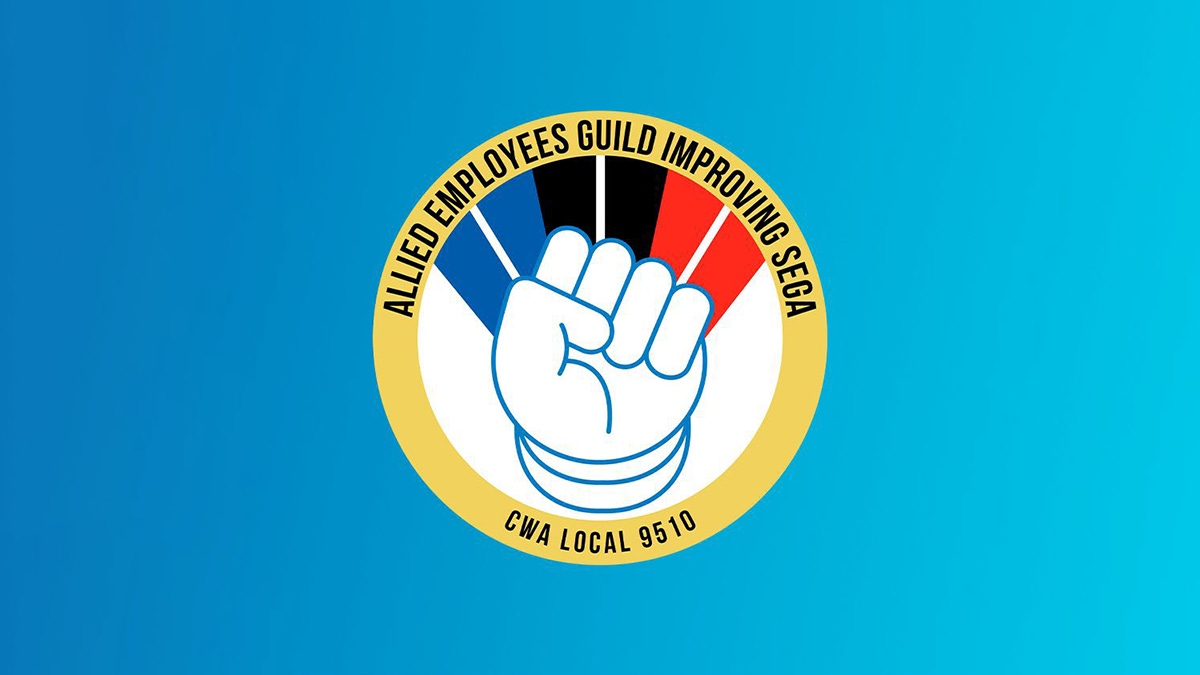Trending
Opinion: How will Project 2025 impact game developers?
The Heritage Foundation's manifesto for the possible next administration could do great harm to many, including large portions of the game development community.
AEGIS CWA union member Jasmin Hernandez told Game Developer the new contract will "provide a more secure environment" for employees.

Unionized workers at Sega of America have secured a major victory after voting to ratify a first collectively-bargained contract.
The news was described as a "watershed moment" for AEGIS-CWA union members, who will now benefit from an improved contract that contains better protections for organizing workers and guarantees basebuilding raises for every employee in the unit.
"Some workers received regular raises, but some did not–this was often based on title or department. Also raises were wildly different person-to-person," explained a CWA spokesperson. "These base building raises ensure that everyone gets a raise and Sega can always grant additional raises based on merit."
The ratified contract also includes layoffs protections (including the recall rights for temporary layoffs and severance for permanent layoffs); a commitment to properly crediting all workers on relevant projects (including early QA testers); and a codified commitment to continuing hybrid work initiatives for at least six months. It was noted that Sega doesn't currently intend to change its hybrid work policy, but now AEGIS-CWA has that commitment in writing.
AEGIS-CWA also secured a codified annual bonus plan, retirement benefits, health insurance, parental benefits (include permission for parents to pump breast milk on the clock), and expanded bereavements leave. Better pathways for requesting job-related trainings were baked into the new contract alongside a commitment that will require Sega to provide a worker-led committee with advance notice when it wants to implement policy changes, including those related to AI usage.
Sega of America employee and AEGIS–CWA member Jasmin Hernandez told Game Developer the new contract will "provide a more secure environment" for workers, many of whom have found themselves in the crosshairs during an alleged union-busting campaign.
"We bargained this contract amidst intense volatility and widespread layoffs within the video game industry. Unfortunately, some of our unionized staff who were temporary employees in QA and localization were impacted by these layoffs as well. We're all still navigating the grief and impact of Sega management’s decision. As awful as these layoffs were, we were in a unique position that allowed us to negotiate the effects of that decision because we had unionized," she said.
"Through discussions with management, we were able to save double the amount of jobs and ensure that severance was provided to our coworkers who were affected by the layoff. In addition to that, if Sega decides to rehire for these roles in the next few months, we will be notified five days prior to jobs being posted externally so that our former members have the first chance to reapply. This experience highlighted the importance of negotiating more protections for us in our contract."
Breaking down how negotiations unfolded, Hernandez explained AEGIS–CWA, which represents 150 full-time and temporary workers across multiple departments at Sega's offices in Burbank and Irvine, formed a five-strong bargaining committee to engage with management and push for better working conditions.
"There were five of us elected onto the bargaining committee, representing different roles and departments within Sega of America. We sent out a detailed bargaining survey so that we could understand the issues faced by our unit," they said. "Then, we got to work writing proposals detailing our desired working conditions and policies, with the help of experienced advisors from CWA Local 9510."
Hernandez said the committee "hit a rhythm" after a few bargaining sessions, with each side submitting proposals, breaking to discuss, and then countering or accepting those offers. "This continued on until we had our full contract," she continued. "While there’s more we want to fight for in the future, we’re proud of what we secured in this first contract. It wouldn’t have been possible without our membership mobilising and showing support during the whole process."
Hernandez said it's important to highlight that, when management is committed to bargaining, securing a first contract in a reasonable timeframe is completely viable. "We really hope other companies follow the same path and are open to the dialogue and willing to make changes that benefit everyone," she continued.
With that contract finally ratified, she told Game Developer the mood within AEGIS–CWA is one of positivity and relief. "It feels a bit surreal," she explained. "As a collective, I think it means that this is only the beginning and we’re really looking forward to how we can grow and build and expand on things in the future."
When asked what advice she'd give to other developers who are perhaps interested in the prospect of unionization, Hernandez said the first step is to simply start talking with your colleagues and co-workers. "Each workplace has its own unique challenges when it comes to organizing, but remember you are the experts in your working conditions," she added. It's also important, she notes, to have grace for those involved in that process. "It’s a challenging process, and you’ll have each other to rely on."
Interested in learning more about the value of collective action in the game industry? We recently spoke with a number of union members and insiders from around the world to learn why developers are rallying together.
You May Also Like